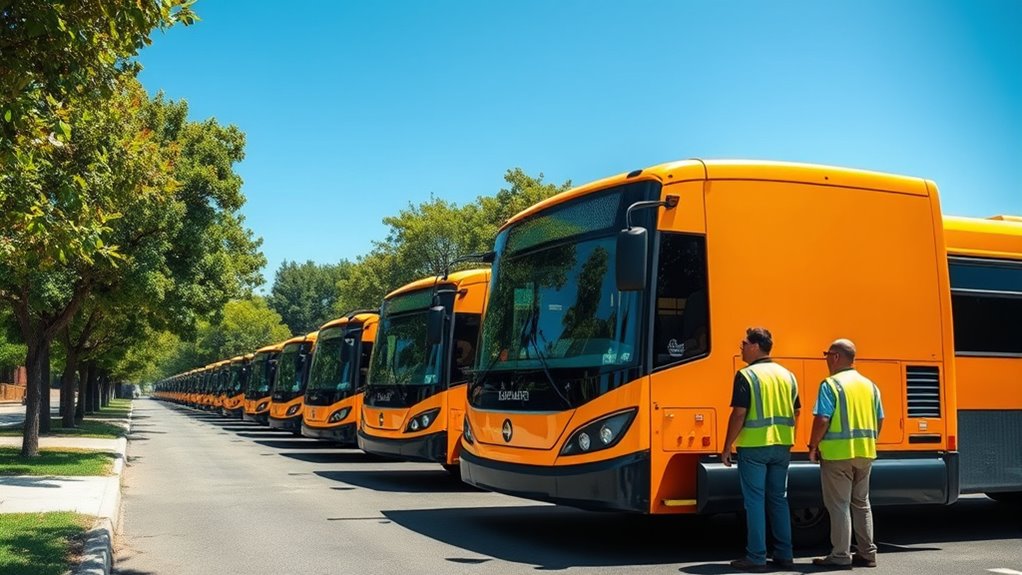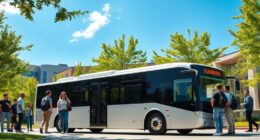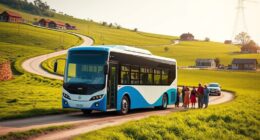As an electric bus driver on quiet, emission-free routes, you help reduce pollution and create a more peaceful environment for communities and students. Proper battery maintenance and eco-driving techniques guarantee safety, reliability, and extended vehicle lifespan. Your role not only supports sustainability goals but also keeps routes on schedule and minimizes disruptions. If you want to discover how your efforts impact the future of transportation, continue to explore the voices from U.S. school bus fleets.
Key Takeaways
- Electric bus drivers report quieter operations, reducing noise pollution around schools and communities.
- Proper battery maintenance ensures consistent range, allowing reliable, emission-free routes for students.
- Specialized driver training improves confidence in managing high-voltage systems safely and efficiently.
- Electric buses contribute to healthier air quality by eliminating tailpipe emissions during daily routes.
- Drivers highlight the importance of routine charging and monitoring for optimal performance and sustainability.

Electric bus drivers are now steering some of the quietest, cleanest routes in the transportation industry. As more fleets transition to electric vehicles, your role becomes essential in ensuring these buses operate smoothly and efficiently. One of the key responsibilities you’ll have is understanding battery maintenance. Unlike traditional diesel engines, electric buses rely heavily on their batteries, which require regular checks to maintain their performance. You’ll need to monitor battery levels, guarantee proper charging procedures, and report any anomalies that could indicate issues. Proper battery maintenance not only extends the lifespan of the battery but also guarantees the bus’s range and reliability, keeping your routes on schedule without unexpected breakdowns. This means staying attentive to charging schedules, using the right charging equipment, and following manufacturer guidelines. Your knowledge of battery health directly impacts the success of the fleet’s operations and the overall sustainability goals. Additionally, understanding the noise levels of modern electric buses helps in planning routes that maximize comfort for passengers and reduce community disturbance.
Alongside technical knowledge, driver training plays a fundamental role in making electric bus operations safe and efficient. As a driver, you must adapt to different driving styles that optimize battery life and maximize range. Training programs now emphasize smooth acceleration and braking, maintaining consistent speeds, and using eco-driving techniques. These practices help conserve battery power and reduce wear on vehicle components. Moreover, driver training includes familiarization with vehicle controls specific to electric buses, such as monitoring battery status through onboard displays and understanding charging protocols. Training also covers safety procedures, especially when dealing with high-voltage systems, ensuring you feel confident and prepared. Being well-trained allows you to handle the unique aspects of electric buses, which differ from traditional diesel models, and guarantees you’re equipped to troubleshoot minor issues without unnecessary delays.
As you grow more comfortable with battery maintenance and specialized driver training, you’ll notice the benefits firsthand. You’ll contribute to quieter, cleaner streets, reducing emissions and improving air quality in your community. Your expertise helps keep the fleet running smoothly, minimizing downtime and maintenance costs. In addition, being knowledgeable about the technology enhances your confidence and job satisfaction, knowing you’re part of a forward-thinking, environmentally responsible transportation system. Overall, your role as an electric bus driver extends beyond just steering; it involves becoming an integral part of a sustainable future. By mastering battery maintenance and embracing ongoing driver training, you help guarantee these quiet, emission-free routes become reliable, safe, and efficient options for school districts and communities across the country.
Frequently Asked Questions
What Training Do Electric Bus Drivers Receive?
Think of your training as a GPS guiding you through a new landscape. You receive driver certification to master electric vehicle operation, ensuring safety and efficiency. You also learn vital battery maintenance skills, like checking charge levels and managing thermal systems, to keep the bus running smoothly. This extensive training helps you navigate quiet, emission-free routes confidently, making a positive impact on the environment while ensuring student safety.
How Do Electric Buses Handle Extreme Weather Conditions?
You’ll find that electric buses handle extreme weather well thanks to advanced thermal management systems that regulate battery performance. In cold weather, these systems keep batteries warm to prevent performance drops, while in hot conditions, they prevent overheating. This guarantees reliable operation and safety across various climates. Proper thermal management helps maintain consistent battery performance, so you can confidently drive in winter snow or summer heat without worrying about reduced range or power.
What Safety Protocols Are Specific to Electric Bus Operation?
Think of operating an electric bus like tending a delicate plant—you must follow strict safety protocols. You’ll regularly check battery maintenance to prevent issues and stay alert to emergency procedures for potential incidents. Always monitor battery levels, verify proper charging, and know how to respond quickly if a malfunction occurs. These steps keep you and your passengers safe, ensuring a smooth, emission-free journey every time.
How Do Drivers Manage Charging Schedules During Routes?
You manage charging schedules during routes by planning your day around charging logistics and route planning. You monitor battery levels closely, guaranteeing you charge during scheduled breaks or downtime. By coordinating with your fleet’s management, you optimize charging times to avoid disruptions. This proactive approach helps you stay on schedule, maintain safety, and ensure your electric bus is ready for the next route without compromising efficiency or safety.
What Feedback Have Drivers Given About Passenger Comfort?
You notice drivers emphasize the importance of passenger experience and comfort enhancements. They often mention how electric buses provide a smoother, quieter ride, reducing noise and vibrations that can disturb students. Drivers appreciate features like climate control and comfortable seating, which keep passengers relaxed during long routes. Overall, they report that electric buses markedly improve passenger comfort, making the journey more enjoyable and less stressful for everyone onboard.
Conclusion
Imagine a future where your daily commute whispers silently, free from pollution’s grip. Electric bus drivers already experience this peaceful revolution, transforming school transportation into a cleaner, quieter journey. As you consider the path ahead, remember: every quiet mile driven is a step toward healthier communities and a sustainable planet. Don’t just watch change happen—be part of it, steering toward a brighter, cleaner future where silence and sustainability go hand in hand.









